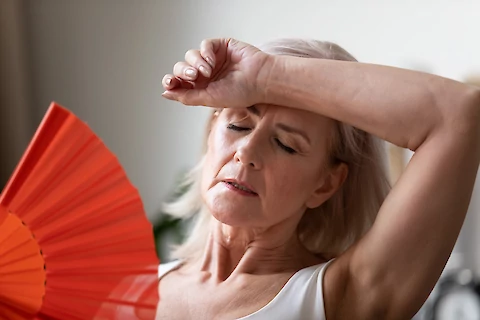
As a primary caregiver, being prepared for any potential medical event is crucial. This is especially true during the hot summer months when heat stroke can pose a serious threat to seniors. Staying informed is critical to keeping seniors safe and healthy.
In this post, we will explore the early signs of heat stroke in seniors and what to watch out for to ensure their well-being during those sweltering summer days.
Early Symptoms of Heat Stroke in Seniors
High Body Temperature
One of the first symptoms of heat stroke is a high body temperature. An average body temperature for seniors may range from 97 to 99 degrees Fahrenheit. However, a temperature of 104 degrees or higher can indicate heat stroke. Elevated body temperatures can lead to dangerous consequences, so take steps to cool down the senior as soon as possible.
Increased Heart Rate or Rapid Pulse
A rapid pulse, such as a heart rate exceeding 100 beats per minute, is another early symptom of heat stroke in seniors. The increased heart rate can place additional stress on their bodies, making other symptoms more severe. Monitoring a senior's pulse can help detect abnormalities and ensure prompt action.
Headaches
Headaches can also signify heat stroke, particularly if they are severe and accompanied by other symptoms. Staying well-hydrated can help prevent these headaches and keep seniors comfortable during hot weather.
Dizziness and Fainting
Dizziness and fainting are common in seniors and can be caused by various factors such as dehydration, low blood pressure, or heat stroke. If dizziness occurs during hot weather and is accompanied by other symptoms, it may be a sign of impending heat stroke.
Nausea and Vomiting
Nausea and vomiting may occur as a result of dehydration and overheating. Encouraging seniors to drink plenty of water can help relieve these symptoms and ensure their bodies remain cool and hydrated during hot weather.
Confusion or Disorientation
Confusion or disorientation can be the most concerning symptoms of heat stroke, as they signify the impact on cognitive function. Monitoring seniors for any signs of confusion during hot weather, especially outdoors or in a non-air-conditioned space, can help detect early signs of heat stroke.
Excessive Sweating or Lack of Sweating
Excessive sweating or a lack of sweating can indicate the body is struggling to cool itself down. If a senior seems to be sweating more than usual or not at all despite high temperatures, it could be a warning sign of heat stroke.
Red, Hot, and Dry Skin
Finally, red, hot, and dry skin can signify heat stroke. Ensuring seniors protect their skin with appropriate clothing or sunblock and recognizing any skin changes early on can help prevent heat stroke from progressing.
Medications and Heat Stroke Symptoms
Some medications may alter heat stroke symptoms or even worsen them. For example, diuretics, antihistamines, antipsychotics, and blood pressure medications can all impact the body's response to heat. Consult with a healthcare professional about any medicinations seniors take and be aware of potential interactions or side effects related to heat stroke.
Unusual Symptoms Based on Medical History
A senior's medical history can also affect heat stroke symptoms. Certain medical conditions may cause unusual symptoms or exacerbate existing ones. Discussing their medical history with healthcare professionals can help identify any unique risks or warning signs related to heat stroke.
We Can Help Care for Seniors This Summer
Being vigilant for early symptoms of heat stroke in seniors can make all the difference in preventing serious complications. At Senior Helpers of South Minneapolis, we provide exceptional care and support to seniors in Minneapolis, Saint Paul, Minnetonka, and Hennepin County. If you need professional assistance in caring for your loved one, contact us to learn more about our services.